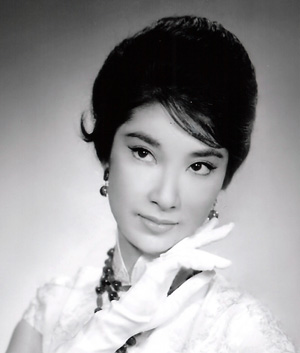
Betty Loh Ti, known as Loh Tih for short, was a Hong Kong actress originally from Shanghai. Known as the "Classic Beauty", she was one of the most celebrated actresses of Hong Kong cinema. She is most famous for her roles in the 1960 film The Enchanting Shadow, for which she was called "China's most beautiful actress" by the jury of the 1960 Cannes Film Festival, and The Love Eterne, which earned her the Golden Horse Award for Best Leading Actress in 1963. She died from barbiturate overdose at the age of 31.
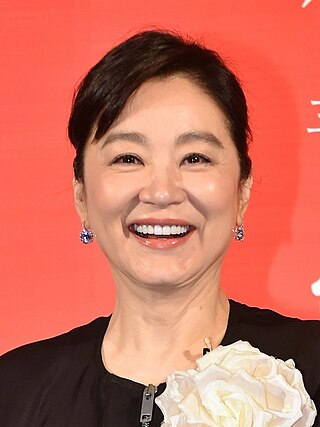
Brigitte Lin Ching-hsia is a Taiwanese actress. She is regarded as an icon of Chinese language cinema for her extensive and varied roles in both Taiwanese and Hong Kong films.

Great Wall Movie Enterprises Limited was Hong Kong's leading left-wing studio and one committed to making progressive Mandarin films with social content as well as entertainment value.
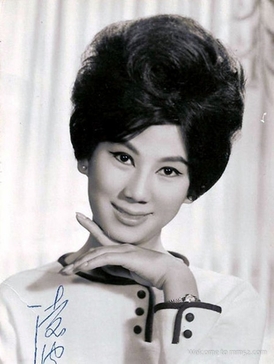
Huang Yuet-chu, professionally known by her stage name Ivy Ling Po, is a retired Hong Kong'sactress and Chinese opera singer. She gained widespread fame during the 1960s for her roles in several popular Huangmei opera films, most notably The Love Eterne (1963), which propelled her to stardom across Asia. Her role in the film is considered a defining performance in the genre, solidifying her status as a cultural icon.
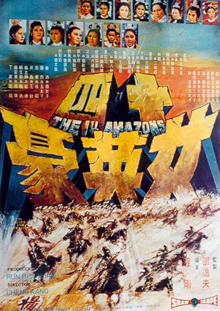
The 14 Amazons is a 1972 Hong Kong wuxia film directed by Cheng Kang and produced by the Shaw Brothers Studio. The award-winning film featured a predominantly female cast. The story is about the female generals of the Yang Family.

The Generals of the Yang Family is a collection of Chinese folklore, plays and novels on a military family from the earlier years of imperial China's Song dynasty (960–1279). The stories recount the unflinching loyalty and the remarkable bravery of the Yangs as they sacrificed themselves to defend their country from foreign military powers, namely the Khitan-ruled Liao dynasty (907–1125) and Tangut-ruled Western Xia (1038–1227).
Siqin Gaowa, born Duan Anlin, is a Chinese-born Swiss actress. She was born in Guangzhou to a Han Chinese father and a Mongol Chinese mother. Her father died when she was 4, she was raised by her mother in Inner Mongolia. She has been married to musician Chen Liangsheng (陈亮声) since 1986 and currently holds Swiss citizenship together with her husband.
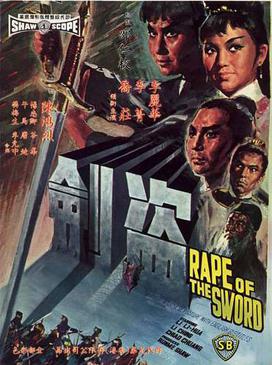
Rape of the Sword is a 1967 Hong Kong wuxia film directed by Yueh Feng and produced by the Shaw Brothers Studio, starring Li Li-hua, Lee Ching, Chan Hung-lit, Kiu Chong and Tien Feng.
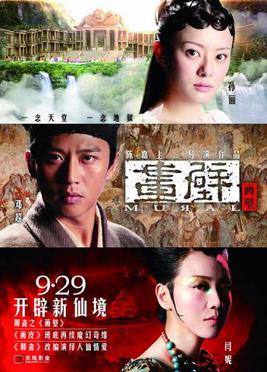
Mural is a 2011 Chinese film co-written, co-produced and directed by Gordon Chan, which stars Deng Chao, Sun Li, Yan Ni, Collin Chou, Zheng Shuang and Eric Tsang. It is directed by the same director who directed Painted Skin (2008). Both stories are drawn from Pu Songling's (1640–1715) collection of supernatural tales Strange Stories from a Chinese Studio.

Legendary Amazons is a 2011 Chinese historical drama film directed by Frankie Chan and written by Chan, Liu Heng and Ma Honglu. The film is based on the stories of the Yang Clan Generals. It stars Richie Jen, Cecilia Cheung, Cheng Pei-pei, Liu Xiaoqing, and Kathy Chow. The film is based on the same source material as the 1972 Hong Kong film The 14 Amazons.
Li Nian is a Chinese actress. Li's most notable role to date is as Guo Haizao, a college graduate who was nurtured by a successful man, on the television series Dwelling Narrowness.
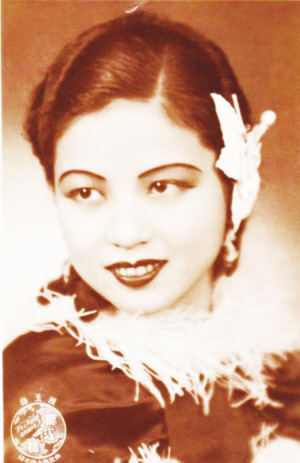
Chen Yumei was a Chinese film actress and singer active during the 1920s and 1930s. In her heyday she was one of the biggest stars in China, crowned "Movie Queen" in 1934. At the peak of her career she married Runje Shaw, the boss of Tianyi Film Company, and retired from acting. She was nicknamed the "frugal star" for her efforts at promoting the virtue of frugality.

The Golden Lotus is a 1974 Hong Kong sex film directed and written by Li Han-hsiang, and produced by Run Run Shaw. The film stars Peter Yang, Hu Jin, Tien Lie, and Chen Ping. Hong Kong Kung fu star Jackie Chan made his film debut in this film and had a minor role as Brother Yun. It is based on the c. 1610 novel of the same name by Lanling Xiaoxiaosheng. The film premiered in Hong Kong on 17 January 1974.
Xia is the Mandarin pinyin romanization of the Chinese surname written 夏 in Chinese character. It is romanized Hsia in Wade–Giles, and Ha in Cantonese. Xia is the 154th surname in the Song dynasty classic text Hundred Family Surnames. As of 2008, it is the 66th most common Chinese surname, shared by 3.7 million people.

Bai Yang was a Chinese film and drama actress mainly active from the 1930s to the 1950s, during which she was one of the country's most popular movie stars. She was considered the foremost of China's "Four Great Actresses," ahead of Qin Yi, Shu Xiuwen, and Zhang Ruifang. Her most famous films include Crossroads (1937), The Spring River Flows East (1947), Eight Thousand Li of Cloud and Moon (1947), and New Year's Sacrifice (1955).

Kimi Hsia Yu-chiao is a Taiwanese actress and television host. She is best known for hosting the SET Metro variety shows Delicious Food All Over the World and Stylish Man – The Chef.
![<i>A Torn Lily</i> 1953 [[British Hong Kong]] film](https://upload.wikimedia.org/wikipedia/en/0/02/Atornlily.jpg)
A Torn Lily is a 1953 Hong Kong black-and-white costume film written and directed by Yuen Yang-an, based on the traditional story of Wang Kui Betrays Guiying. The film was produced by Great Wall Movie Enterprises and stars their 20-year-old starlet Xia Meng in the lead role.
Jiang Luxia is a Chinese actress and martial artist. In 2018, she won the Best Supporting Actress in Hundred Flowers Award for her role as "Tong Li, the Female Machine Gunner" in the movie Operation Red Sea. The film has grossed USD$579 million, and received critical acclaim from critics, making it one of the highest-grossing Chinese films in 2018.
Yang Ziting is a film director, screenwriter, producer, and actor from western China.

Breaking Through is a 2022 Chinese sports drama film from director Wang Fangfang, and stars Meng Meiqi and Xia Yu. The film, which is based on true events and of short-track speed skater Yang Yang, follows the Chinese national short-track speed skating team as they attempt to prevail in winning a gold medal at the 2002 Winter Olympics in Salt Lake City, United States.














![<i>A Torn Lily</i> 1953 [[British Hong Kong]] film](https://upload.wikimedia.org/wikipedia/en/0/02/Atornlily.jpg)
